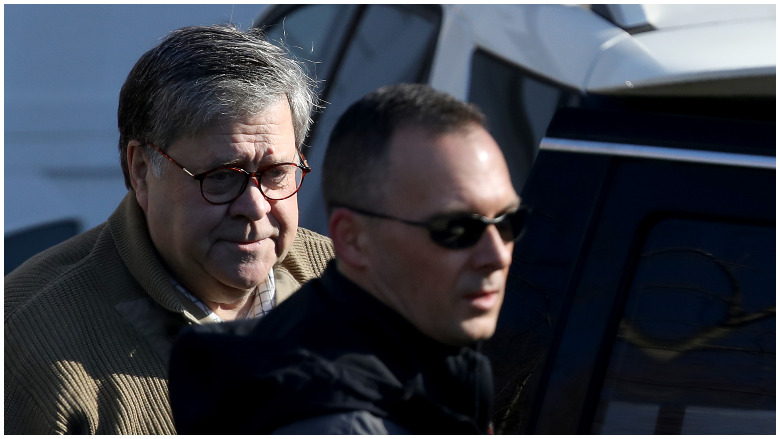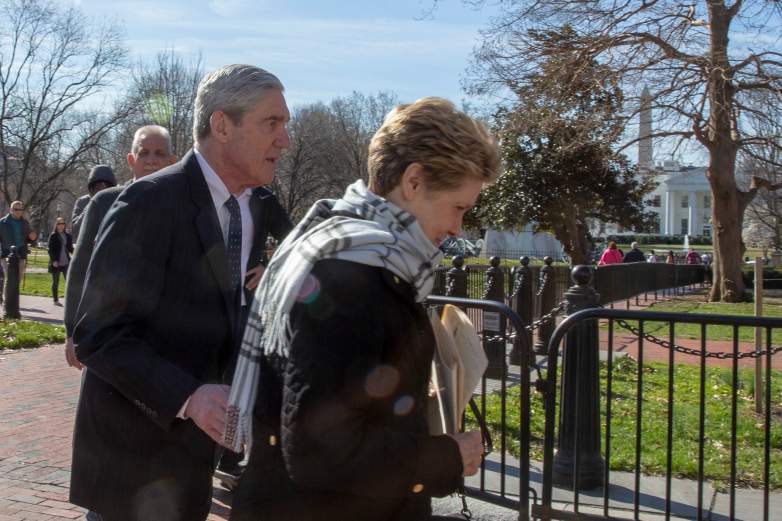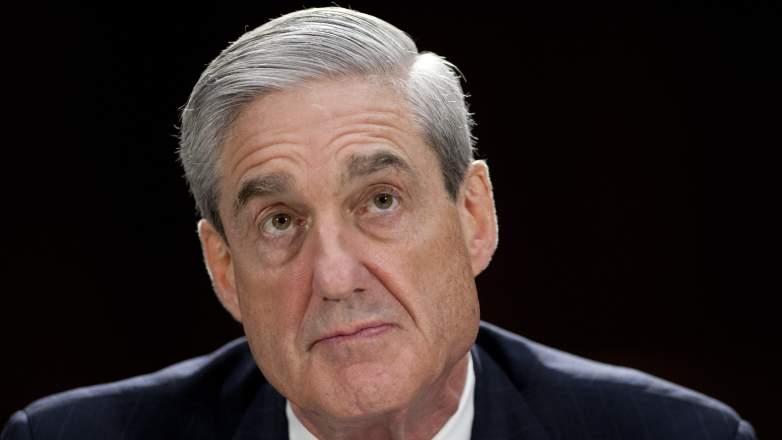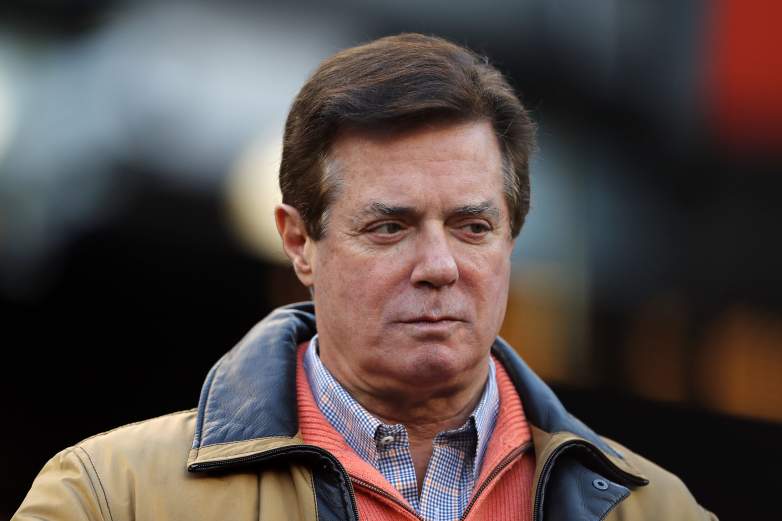
Attorney General William Barr sent a summary letter of the Robert Mueller report’s “principal conclusions” to Congress, saying that Mueller did not find that the Trump campaign “conspired or coordinated with Russia” in Russia’s efforts to influence the presidential election. Meanwhile, Democrats battle for access to the full report.
Barr also wrote that, while Mueller did not come to a conclusion on obstruction of justice allegations, he and Deputy AG Rod Rosenstein had decided Trump would not be charged with a crime on that front, either.
You can read the Barr letter in full here:
Barr wrote: “The Special Counsel’s investigation did not find that the Trump campaign or anyone associated with it conspired or coordinated with Russia in its efforts to influence the 2016 U.S. presidential election. As the report states, ‘The investigation did not establish that members of the Trump Campaign conspired or coordinated with the Russian government in its election interference activities.'”
Barr also confirmed, “The report does not recommend any further indictments, nor did the Special Counsel obtain any sealed indictments that have yet to be made public.”
The report also deals with accusations of obstruction of justice. After making a “thorough factual investigation” into the obstruction allegation, the Special Counsel “ultimately determined not to make a traditional prosecutorial judgment,” wrote Barr.
“The Special Counsel therefore did not draw a conclusion – one way or the other – as to whether the examined conduct constituted obstruction. Instead, for each of the relevant actions investigated, the report sets out evidence on both sides of the question and leaves unresolved what the Special Counsel views as ‘difficult issues’ of law and fact concerning whether the President’s actions and intent could be viewed as obstruction.”
According to Barr, on the obstruction of justice front, the Special Counsel wrote that “while this report does not conclude that the President committed a crime, it also does not exonerate him.” Barr wrote that this decision by Mueller left it to Barr’s office to determine whether the president committed criminal obstruction of justice.
Barr wrote that “Deputy Attorney General Rod Rosenstein and I have concluded that the evidence developed during the Special Counsel’s investigation is not sufficient to establish that the President committed an obstruction of justice offense. Our determination was made without regard to, and is not based on, the constitutional considerations that surround the indictment and criminal prosecution of a sitting president.”
The long-awaited Mueller report was delivered to the AG on Friday, March 22, 2019, and multiple news reports said that Mueller was not planning any additional indictments. That led to immediately competing narratives on Twitter, with some conservatives saying it demonstrated the president was right to call the long-brewing investigation a “witchhunt” because it didn’t prove collusion. For their part, some Democrats argued the Mueller report had already produced troubling accusations against people in Trump’s inner circle, from Michael Flynn to Paul Manafort.
The controversial investigation spanned nearly two years.
What did Barr say in his briefing to Congress on what he has called the Mueller Report’s “principal conclusions”? That’s what people were waiting for all weekend, and, on Sunday, Barr delivered. Bill Barr previously served as U.S. Attorney General during the administration of Republican President George H.W. Bush.
Here’s what you need to know:
AG Barr Says There Were Two Main Russian Efforts to Interfere in the Election but Mueller Did Not Find That the Trump Campaign Was Involved

GettySpecial Counsel Robert Mueller walks with his wife Ann Mueller.
According to Barr, the Special Counsel’s investigation determined that there were “two main Russian efforts to influence the 2016 election.” The first involved attempts by a Russian organization called the Internet Research Agency to conduct disinformation and social media operations in the United States “designed to sow social discord.” The Special Counsel did not find that “any U.S. person or Trump campaign official or associate conspired or knowingly coordinated with the IRA in its efforts, although the Special Counsel brought criminal charges against a number of Russian nationals and entities in connection with these activities.”
The second element, according to Barr’s letter summarizing the Mueller report, involved the Russian government’s efforts to conduct “computer hacking operations designed to gather and disseminate information to influence the election.”
The Special Counsel found that Russian “government actors successfully hacked into computers and obtained emails from persons affiliated with the Clinton campaign and Democratic Party organizations, and publicly disseminated those materials through various intermediaries, including WikiLeaks.”
However, wrote Barr, the “special counsel did not find that the Trump campaign, or anyone associated with it, conspired or coordinated with the Russian government in these efforts despite multiple offers from Russian-affiliated individuals to assist the Trump campaign.”
Barr notes that “in assessing potential conspiracy charges, the Special Counsel also considered whether members of the Trump campaign ‘coordinated’ with Russian election interference activities. The Special Counsel defined ‘coordination’ as an ‘agreement – tacit or express – between the Trump campaign and the Russian government on election interference.”
Barr Said the Lack of Findings Relating to Russian Collusion Contributed to the Obstruction Decision

Getty
According to Barr, he and Rosenstein opted against accusing Trump of obstruction of justice by noting “that the Special Counsel recognized that ‘the evidence does not establish that the President was involved in an underlying crime related to Russian election interference.’” That’s not determinative, he wrote, but “the absence of such evidence bears upon the President’s intent with respect to obstruction. Generally speaking, to obtain and sustain an obstruction conviction, the government would need to prove beyond a reasonable doubt that a person, acting with corrupt intent, engaged in obstructive conduct with a sufficient nexus to a pending or contemplated proceeding.”
He wrote: “In cataloguing the President’s actions, many of which took place in public view, the report identifies no actions that, in our judgment, constitute obstructive conduct, had a nexus to a pending or contemplated proceeding, and were done with corrupt intent, each of which, under the Department’s principles of federal prosecution guiding charging decisions, would need to be proven beyond a reasonable doubt to establish an obstruction of justice offense.”
Democrats Have Promised to Issue Subpoenas, if Necessary, to Get the Full Report

GettyRobert Mueller’s long-awaited report is complete and headed to the Justice Department.
Democrats are surely not going to be satisfied with a summary of the report from Bill Barr, who is, after all, a Trump nominee. They’ve pledged to do whatever it legally takes to get access to Mueller’s entire document.
“We will try to negotiate. We will try everything else first. But if we have to, yes, we will certainly issue subpoenas to get that information,” House Judiciary Chairman Jerry Nadler said on CNN’s “State of the Union” Sunday.
Nadler wrote: “DOJ has just sent us a very brief letter about the Mueller report, which we will share shortly.” It was reportedly four pages long.
Nadler later tweeted, highlighting the line in the report about obstruction of justice accusations, “The Special Counsel states that ‘while this report does not conclude that the President committed a crime, it also does not exonerate him.’” He also tweeted, “The Department of Justice ‘determined not to make a traditional prosecutorial judgement.’”
When it comes to releasing the full report, Barr wrote that he is bound by rules that can limit disclosure of materials in grand jury proceedings. He wrote that he has asked for the assistance of the Special Counsel in identifying what such information is in the report, and stated that he must also “identify any information that could impact other ongoing matters, including those that the Special Counsel has referred to other offices.” He will then move forward to determine “what can be released in light of applicable law, regulations, and Departmental policies.”
The Mueller Investigation Led to Charges Against 37 People

GettyPaul Manafort.
In the end, the Mueller investigation led to more than three dozen charges, but most of those were against Russians. The probe was investigating whether the Trump campaign colluded with Russians in an attempt to interfere with the 2016 presidential election.
The tale of the Mueller tape: 37 defendants, 26 of them Russians, three Russian companies, and six people affiliated with President Trump. Seven people have pleaded guilty. Paul Manafort, the president’s former campaign chairman, was convicted after a trial, but the charges did not relate to the Trump campaign or to accusations of collusion.
Meanwhile, some conservatives have alleged that anything short of collusion would be a victory for Trump. Democrats have pointed to ongoing probes in the southern district of New York. You can read more about the Russian indictment here.
Deputy Attorney General Rod Rosenstein announced the charges on July 13, 2018. The indictment charges that the 12 GRU members “intentionally conspired with each other, and with persons known and unknown to the Grand Jury (collectively the “Conspirators”) to gain unauthorized access (to “hack”) into the computers of US persons and entities involved in the 2016 presidential election, steal documents from the computers, and stage releases of the stolen documents to interfere with the 2016 US presidential election.”